Why Do These Resources Matter?
Young people are inheriting a world shaped by wildfires, droughts, floods, and climate displacement. But alongside the headlines and heatwaves, there are quieter impacts: overwhelming anxiety, unspoken grief, guilt over privilege, frustration with inaction, and fear for the future.
At Green Mind, we believe these feelings are not weaknesses, they are signs of deep care. Yet few spaces exist where young people, especially in rural and under-resourced communities, can process these emotions in a way that is trauma-informed, culturally grounded, and hopeful.
Our toolkits and guides were born out of this need. Co-developed with youth, mental health professionals, educators, and Indigenous Elders, these resources reflect lived realities and healing practices across Canada. They’re practical, inclusive, and most of all, human.
Whether you’re a teacher trying to introduce emotional language into a science class, a parent unsure how to respond when your child cries after watching the news, or a youth worker running a leadership retreat, we’ve built these tools for you.
Explore Our Toolkit Collection
Each resource is organized by audience and includes downloadable materials, facilitation tips, and adaptable formats. Many of our users tell us they revisit these guides multiple times, using them not only to support youth but to reflect on their own relationship with the environment.
You can filter resources by Age, Setting, or Topic, or browse our featured toolkits below:
1. Climate Wellness Toolkit for Youth
Age Group: 12–22
Format: Downloadable PDF + Customizable Worksheets
Estimated Time to Complete: 4–6 sessions (adaptable)
Overview:
This is our most comprehensive and widely used toolkit. It introduces eco-emotions like climate grief, anxiety, and guilt, and provides structured yet flexible activities for self-awareness, regulation, and youth-led action.
What’s Inside:
● Interactive “Climate & Me” reflection journal
● Emotion mapping exercises with guided prompts
● Somatic grounding activities (movement, breathwork, nature-connection)
● Templates for designing your own climate wellness campaign
● Optional peer-sharing activities and mental health check-ins
Use this if:
● You’re starting a wellness initiative at school or a camp
● You want to help youth name and understand difficult emotions
● You’re creating a youth council or action committee
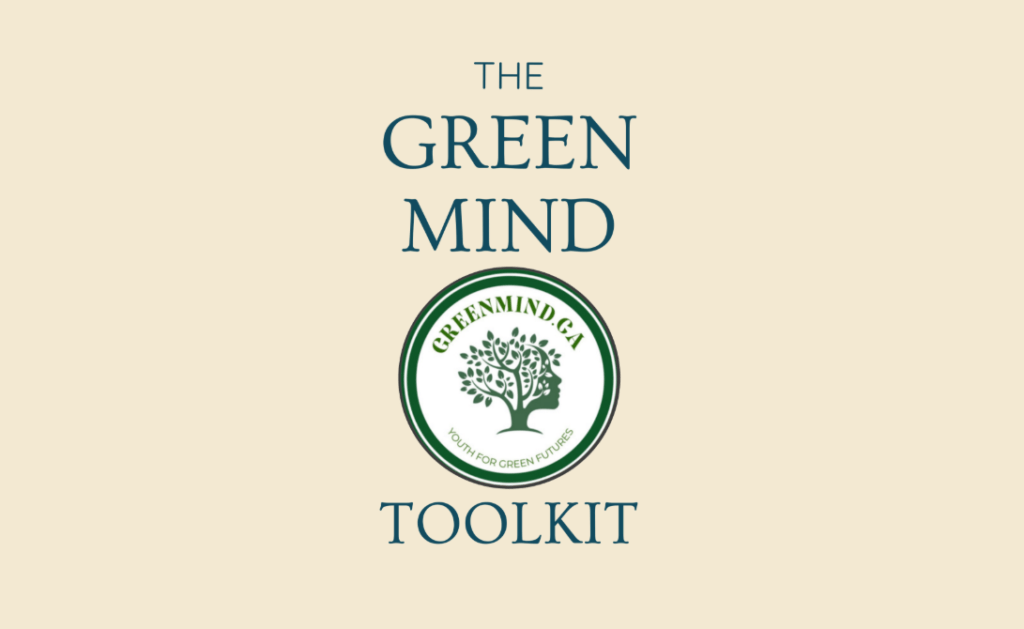
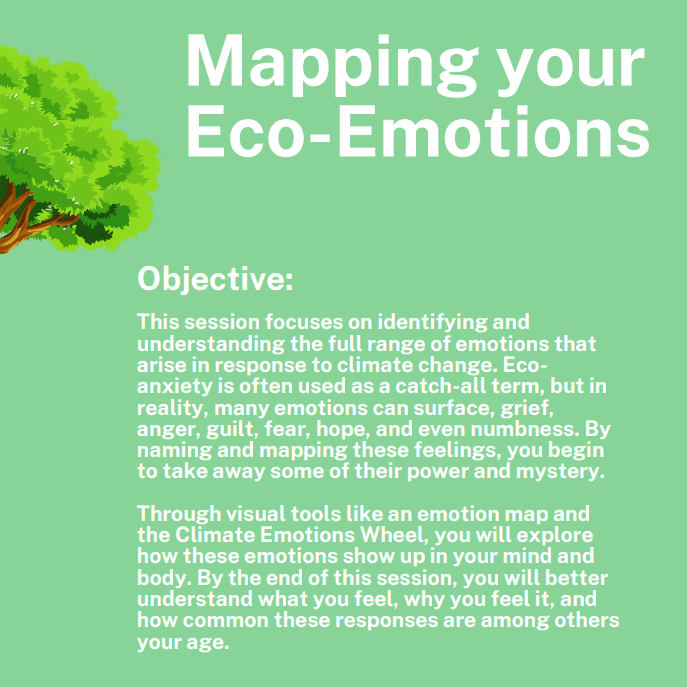
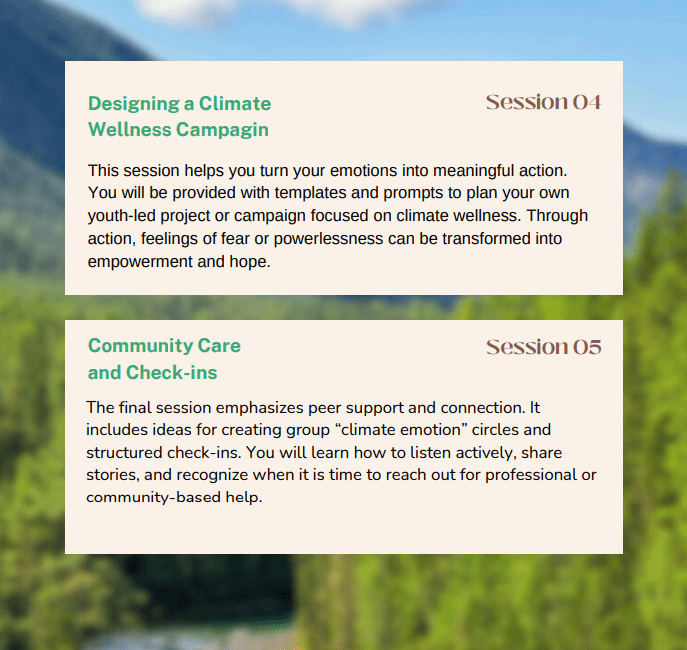
2. Self-Reflection Zine: “Finding My Climate Identity”
Age Group: 10–20
Format: Printable Zine (Foldable PDF)
Estimated Time to Complete: 60–90 minutes (or ongoing journaling)
Overview:
Part art therapy, part storytelling journal. This creative zine invites youth to explore their personal climate stories through poetry, drawing, and collage.
What’s Inside:
● Prompted pages like: “The First Time I Felt Climate Grief”
● Space for illustrations, affirmations, and emotional self-checks
● Pages to explore values, cultural identity, and land connection
● Encouragement to turn insights into action
Use this if:
● You’re hosting an arts-based youth session
● A young person needs a quiet, private way to process their feelings
● You’re a youth yourself looking for a place to begin
Tip: Many facilitators use this zine to open small group journaling circles.

3. Intergenerational Dialogue Starter Kit
Audience: Youth + Elders / Parents / Knowledge Holders
Format: Facilitator Guide + Printable Conversation Cards
Estimated Time to Complete: 90 minutes to multiple sessions
Overview:
This kit fosters dialogue between youth and elders about climate memory, land, grief, and resilience especially within Indigenous, rural, or displaced communities.
What’s Inside:
● “Story Seeds” deck with 30+ discussion prompts
● Respect-based guidelines for circle facilitation
● Optional land-based ceremony adaptations
● Closure activities for emotional safety
Use this if:
● You’re facilitating an intergenerational retreat or community dinner
● You work in cultural programming, libraries, or schools
● You want to bridge knowledge between generations
Tip: Youth have told us these conversations help them feel “less alone” in their fears.
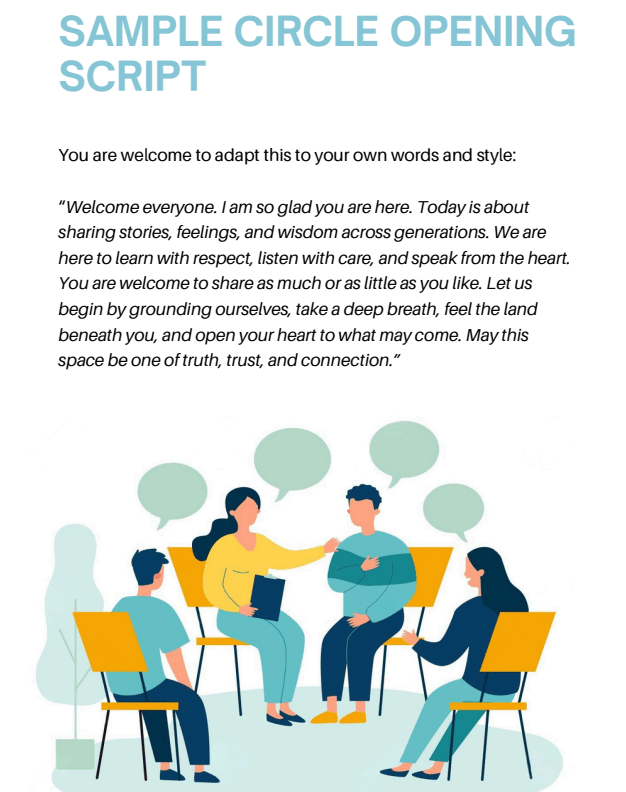
4. Facilitator Guide: Supporting Newcomers with Climate Grief
Audience: Youth Workers, Teachers, Settlement Staff
Format: PDF Guidebook + Activity Templates
Estimated Time to Complete: Flexible modules (4–8 sessions)
Overview:
This guide supports newcomer and refugee youth experiencing climate displacement, cultural disconnection, or migration-related grief.
What’s Inside:
● Definitions of climate-related trauma and grief
● Grounding and containment tools for emotional safety
● Worksheets for grief mapping, identity anchoring, and rebuilding trust
● Guidelines on working across cultures and languages
● Storytelling prompts and translation strategies
Use this if:
● You support youth with lived experiences of environmental migration
● Your group is culturally diverse or multilingual
● You want to integrate emotional support into newcomer programming
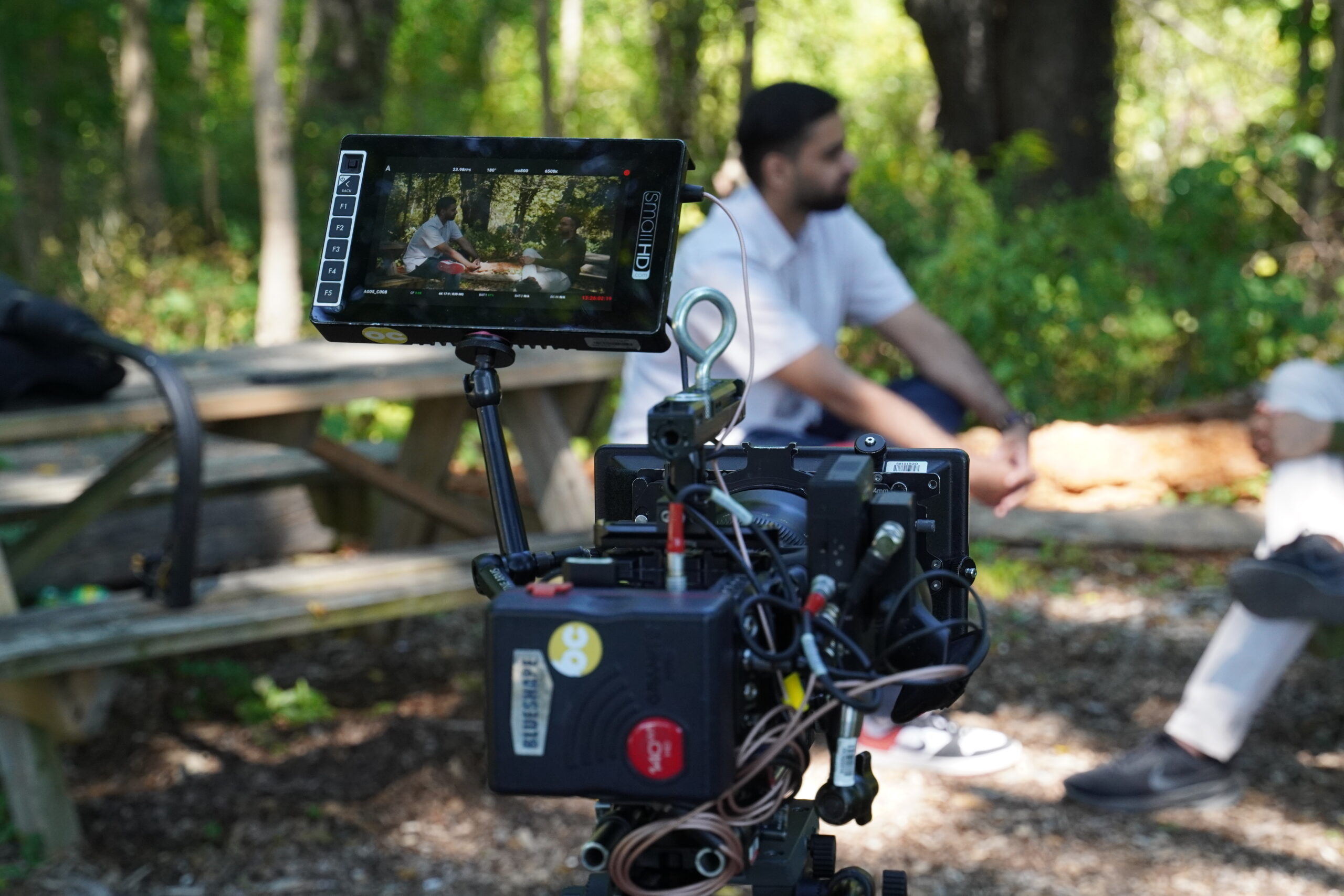
5. Parent & Caregiver Toolkit: Talking to Kids About Eco-Emotions
Audience: Families, Pediatric Clinics, Caregivers
Format: PDF Booklet + Printable Card
Estimated Time to Complete: Flexible (per activity)
Overview:
This resource helps parents and caregivers talk about climate emotions in honest, age-appropriate, and hopeful ways. It encourages connection and calm, not fear.
What’s Inside:
● Sample conversations tailored by developmental stage
● Strategies for managing parental eco-guilt and distress
● Prompts for everyday routines (bedtime, nature walks, meals)
● Family resilience activities based in play and nature
● Emotion tools for younger children (e.g., calming cards, wheels)
Use this if:
● You’re unsure how to respond to a child’s climate-related fears
● You want to build stronger emotional communication as a family
● You’re a healthcare provider or counselor working with families
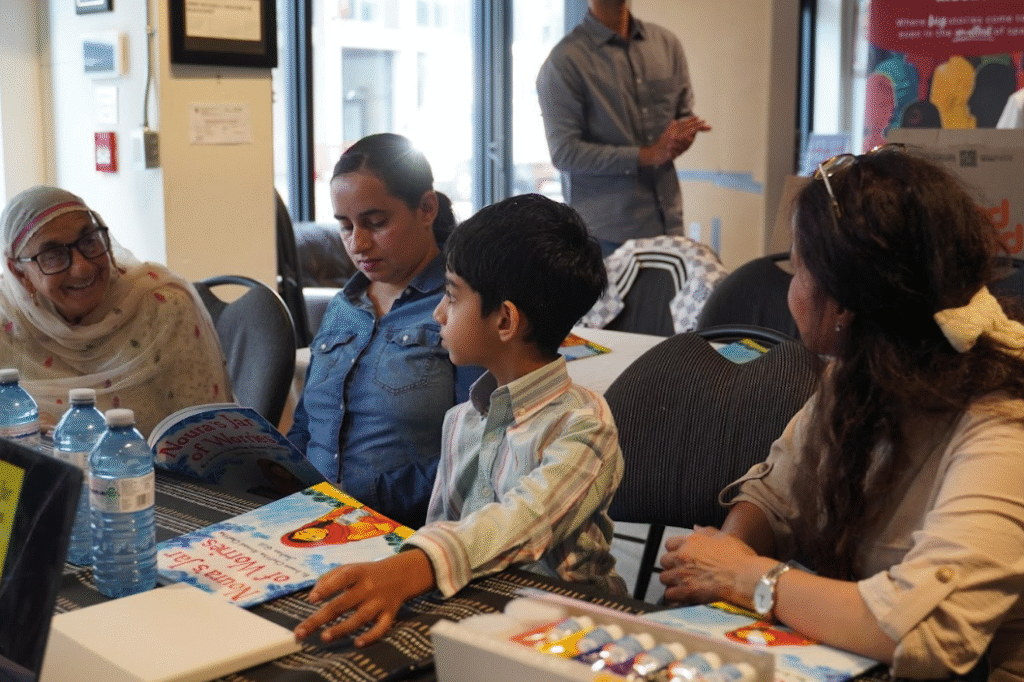
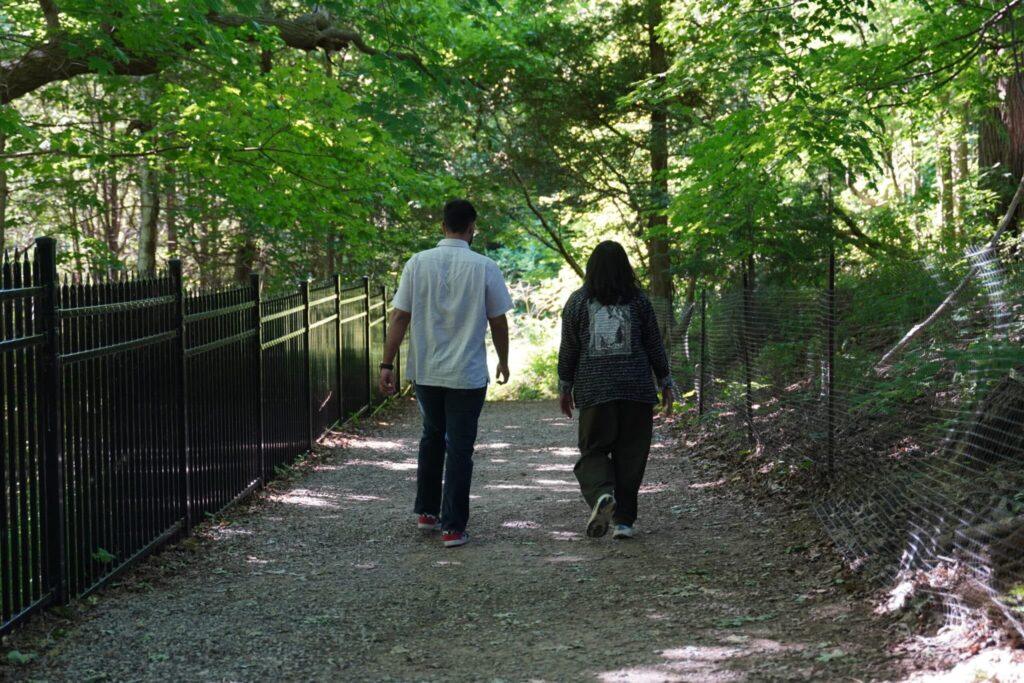
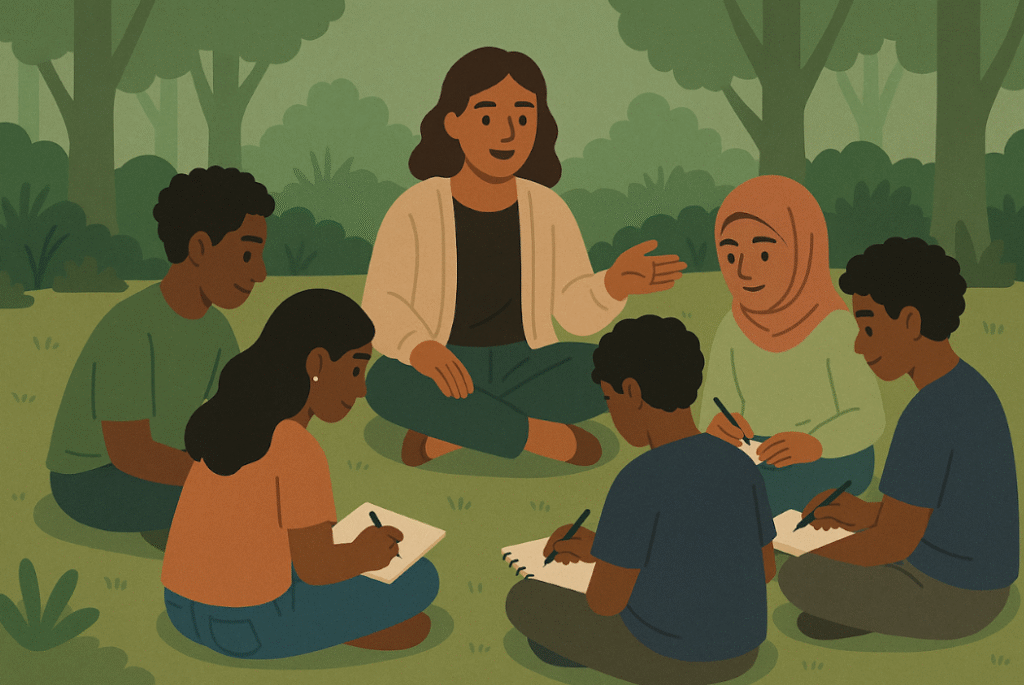
Multimedia Resources
In addition to our printable guides, we also offer:
● Short explainer videos on climate anxiety, coping strategies, and youth resilience
● Audio recordings for breathwork, body scans, and grounding
● Live and recorded webinars on facilitating climate mental health conversations
● Interactive workshops co-led by youth and clinical professionals
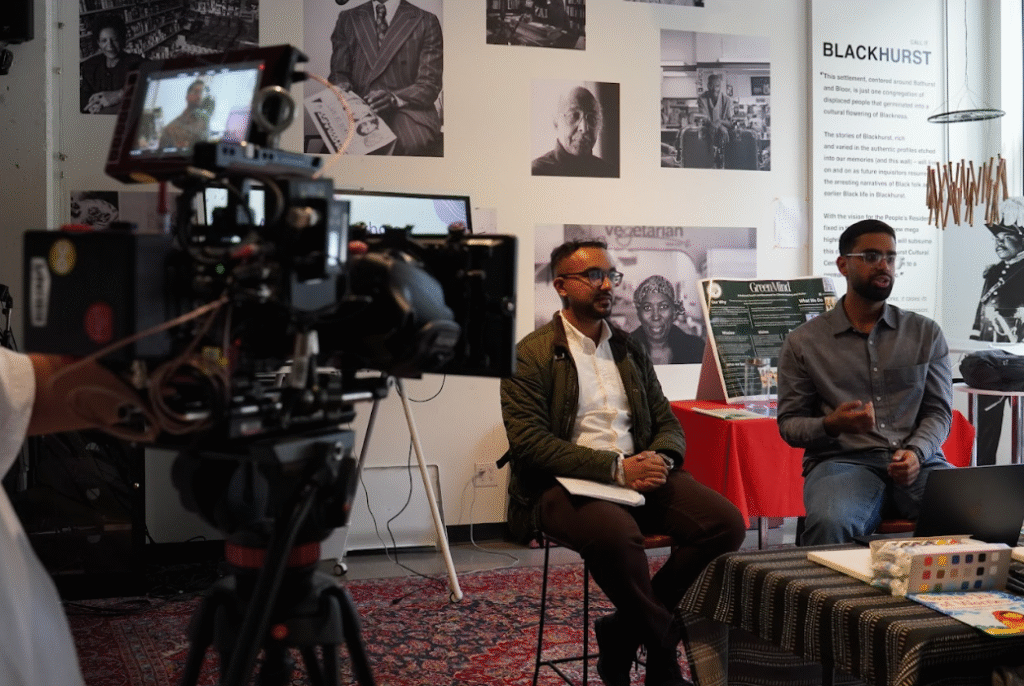
Accessibility & Community Support
All Green Mind resources are free to use for non-commercial, educational, and community purposes. We are actively working to make translations available in French, Cree, Arabic, Urdu, and other languages spoken in newcomer and Indigenous communities.
For:
● Custom training or workshops
● Adaptation to local contexts
● Printed copies for your organization
● Collaboration on co-developing new toolkits
Please reach out through our Partnership Request Form.
We would love to work with your school, cultural center, clinic, or community initiative.

